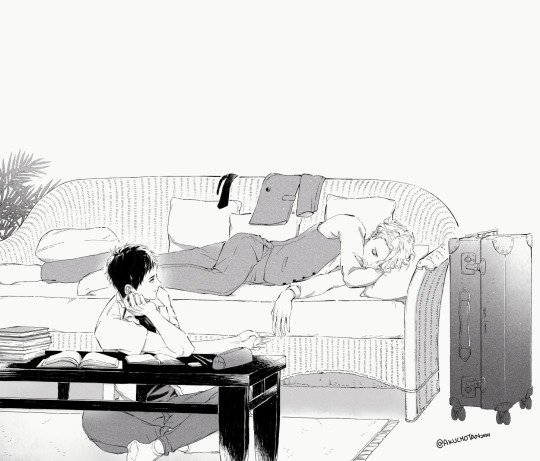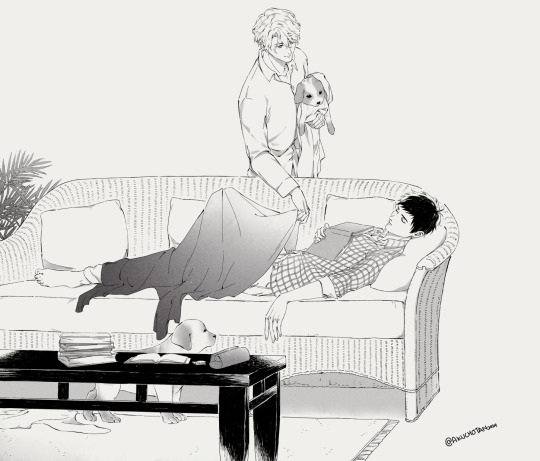elio • he/they/she • i like things and write sometimes • ao3: thegoddamnhat • carrd: crescentmoonkei
Last active 60 minutes ago
Don't wanna be here? Send us removal request.
Text
Seigi’s Queer Coming of Age
(Author’s Note: This post is over 2,300 words long according to Microsoft Word. There is no “read more” link. If you do not want to read this many words of me rambling about Seigi’s queerness please just hit “J” now. You will be scrolling for a while.
Author’s Note The Second: This was written up for @riku7se‘s birthday today. Happy birthday!)
The Case Files of Jeweler Richard is a story about a lot of things, but first and foremost, it is Seigi’s story. Seigi’s story of self-discovery, acceptance of the man he discovered, and becoming an adult. A story of him discovering the world and discovering himself inside that world.
And it’s a very queer story.
Seigi begins the series not knowing any queer people (that he’s aware of) and not knowing pretty much anything about queerness as a concept. He mentions seeing parades—he knows it exists. But he also says he thought every queer person knew what they were and were actively proud of who they were. Seigi was both unaware of and certainly not proud of anything like that.
But then, don’t most queer people start that way?
Seigi met Richard and understood nothing except that Richard was beautiful, and that his feelings for Richard were akin to that of the attraction in a romance novel.
What did he do with that? Immediate denial.
Well, that doesn’t make him less queer. He still had no idea what was what, still hadn’t had an exposure to queerness. At least he didn’t pretend Richard wasn’t attractive.
He met Tanimoto shortly after he met Richard, another lovely gemology geek, and any attraction he had to Richard was immediately reassigned to her. Sure, Richard was beautiful, he’d never deny that, but that didn’t mean anything, did it? He was in love with Tanimoto, after all. His kinship to her was heteronormative (or at least it could appear that way). As long as he was in love with Tanimoto, he obviously couldn’t be attracted to Richard…right? And she wasn’t available—he didn’t have to deal with his feelings or attractions at all.
But Richard wasn’t even the first man Seigi considered building a life with! By the time he was in middle school, he was already thinking of being a man’s “housewife,” although he certainly didn’t think of it in terms of attraction. He wanted to bake and clean and take care of someone (take care of…a man). He liked pink (and orange) instead of blue, and his mother ignored this preference and bought him blue anyway. He was mocked by his classmates for his gender non-conformities they didn’t understand the same way he was teased for his sense of justice and protecting people.
He just also never understood how that might be queer.
By the time we hear about Hase in volume two, Richard has notice something a bit…well, not heteronormative about Seigi, but Seigi still has yet to notice anything at all. He’s gone so long without having to confront it that simply having the feelings won’t push him.
Then he has his dreams of Richard kissing him (or, well, close enough). And as confused and clueless as Seigi can be, he’s not that clueless. But he still wasn’t up to dealing with it, not until he had to or lose Richard completely: when Saul demanded an answer to it before he would tell Seigi anyway.
Saul questioned Seigi’s feelings in Richard’s castle where he protects everyone from judgment and prejudice. Forced him to find an answer, a real answer, if he wanted to chase Richard down. And after Richard’s story about his ex, Seigi comes to a conclusion: if Richard, someone he admires so much, as a man, as a good man he’d like to be like, could be queer: maybe it’s okay if he is? Maybe he is, too? Maybe, just maybe, his admiration is something more profound than admiration for an employer?
He questions over and over if his feelings are love. If that’s the right word. If there is a word. If he has to have a word. If his feelings truly are so different from what he always thought they were. The words he says to himself that still haunt me are
“Is this love? Does this count?”
Is this love, even though it’s not heterosexual love for a woman from a man? Does it count, can it still be love, even when Seigi’s feelings haven’t been vetted by society and approved? Is it okay to feel the way he does? Can his feelings, someone who barely knows what he’s feeling or talking about, count as something like that? Can he feel something so profound without even knowing?
But even when he says, yeah, this is definitely love, this is definitely something important, he doesn’t decide that what kind of love it is. Is it romantic? He still doesn’t know. And to him, it doesn’t matter. His dreams of something with Richard are the beginning of his questioning, not the end. Everything before that was him reacting with frustration to people’s assumptions about him that he still hadn’t come to agree with. They saw something in him that he didn’t see, and it frustrated him.
It takes a long time to understand, learn, and unpack feelings to see that they don’t align with what society has prescribed, especially after you’ve spent decades twisting yourself into something acceptable for it.
After London—after Seigi has accepted something deep and profound about his affection for Richard, if not that they’re necessarily something queer, his college shifts to focus on career plans and life plans. Shimomura, the only person who ever understood his feelings around Richard even a little, who understood even without words, non-heteronormative attraction to something—realizes he doesn’t fit into society’s plan for him either and rejects it by flying off to Spain and starting his life completely over somewhere that Japan’s social structures no longer had any bearing on him.
Seigi learns more about Richard and his own lifetime or struggles. He learns more about the world. He learns more about love and the shapes it can take, and he learns more about queerness and partnerships, and has to put his hopes for Tanimoto to spare him from a queer existence to rest. While Seigi might not have completely given up on a woman entirely, he’s certainly thinking of Richard in that role—a rich woman of peerless beauty, Seigi? There is only one person you think is of peerless beauty, and it’s a man, and he’s right there next to you.
And with the way the series discusses beauty as not just a physical thing, but a choice to see something, a choice made of love and affection and determination, a belief in someone and something, Seigi seeing Richard as beautiful means his feelings for Richard are…well…peerless.
Richard is his angel walking along the streets with his wings on display: attracting everyone’s attention, fitting in nowhere, but touchable and close and part of Seigi’s world the way Tanimoto, flying high and alone, never can be.
(Sometimes, I can’t believe Seigi really said that).
And then, just as Seigi is really starting to come into his own, it’s all threatened by a biological family member who never knew or loved him properly, not as who he is, started demanding things from him and a relationship from him that Seigi not only couldn’t provide—he straight up refused to.
Sound familiar to anyone?
Seigi’s bio-father found him through a few careless comments on social media—something Seigi has always been quite careful about. When Jeffrey made a comment about his family choosing love (and wow, what a statement), he immediately deleted all photos of Seigi at request without a fuss. And knowing Jeffrey’s own gayness, I can see how he would completely understand why Seigi would want to keep things locked down and private.
Seigi’s trauma is that of a domestic abuse survivor who’s terrified of himself, but he is a man who is terrified of romance, of love, of partnership, of finding someone he truly cares for, because his feelings will mean he ends up hurting them irrecoverably. It’s one of the queerest narratives out there. Usually it’s vampires or something, but Seigi’s feelings fit here, too. He cares about Richard too much, and he’s terrified of those feelings for himself, what they mean he’ll become, and what they might do to taint Richard if he voices them. So he does his best…not to.
Richard, thankfully, has none of that nonsense and helps Seigi work through it, but it’s a trauma Seigi still deals with even years later. It’s not something he just magically gets over. He needs time to acclimate to the fact that his feelings are okay and they’re not going to hurt anyone.
And then Seigi is off to Sri Lanka, thanks to Richard rescuing him, and he can bake and housekeep in peace and wear sarongs instead of pants all he likes. A place where he’s so alone he has no choice but to learn about himself.
When Seigi picks up social media this time, it’s under a pseudonym and the only person he knows in real life who announced himself is someone he personally invited to see it. Someone he knew would understand and trusts: Shimomura, who has in the years since only stayed dancing to his own weird little tune.
The only friends Seigi keeps in close contact with after college are Tanimoto and Shimomura: people who have as little interest in a “normal” life as Seigi does, and who simply have already been more able to admit it. Having them in his life, as inspired by him as they claim to be, also helps him figure out who he is and that’s it’s okay to just be…weird.
And boy, does Seigi get a little weird. The books after the time skip are full of travel, full of exposure to people who don’t approve him and don’t approve of his relationship with Richard. And enough distance from Richard that it’s impossible to deny how badly he wants Richard in his life.
Once again, Richard’s relationship with Seigi is put in danger (this time by someone who wants him to marry someone else), and Seigi is forced to reckon with the fact that…he doesn’t want it to change. Not like that. What Seigi wants is to have a very clingy, exclusive relationship with Richard—and the idea of Richard having any of that with someone else, the idea of Richard sacrificing any of that to someone else, brings him to tears. Brings him back to realizing how much Richard means to him, how jealous he is of the idea of Richard marrying someone else.
Jealous enough to ask Richard out. A thoughtless question motivated not by having fully sorted through his feelings, but just pure want for Richard and to be with Richard. He rushes himself because he feels he doesn’t have time not to. He’s still not ready. He still doesn’t understand what it is he wants. But he’s now willing to clumsily pursue his own wants, at least.
Richard responds to that question, interestingly enough, not by saying yes, but by going into a long speech about how they choose partners, and how it’s not the way most people do, or the way society would expect them to. That neither of them choose partners based on practical concerns, but of what their heart wants most. And how that can get them both into trouble.
Especially if what their heart wants most isn’t something society wants to let them have.
Seigi was always a reasonably popular kid, at least in college—he had a lot of friends, if not close ones. Enough to go out drinking, enough to tell about Richard and promptly be teased for it because he sounded like he was describing a lovely new girlfriend and not his grumpy British boss. But by the time he’s spent a few years at Étranger and in therapy, seeing the world and everything it contains, he doesn’t fit with them anymore. He has changed too much and become too much a part of a foreign world to them, and they can’t understand him. He doesn’t belong to their world anymore, or their understanding of relationships.
In fact, they make fun of him. And Seigi didn’t quite expect it, then but by “Operaphile,” he knows. He fears it, and that’s why he wants to keep something so special and precious to him, something important to him, away from prying, judging eyes who won’t understand and will think it wrong of him to like something like opera (or…men). But one day, he will be strong enough, brave enough, to show who that is to the world.
And he gets the chance to start.
Seigi is included in the small family gathering of Richard’s uncle’s funeral—there for no reason other than to support Richard, but included as a matter of course, because of course he is Richard’s family. He’s allowed to go to the intimate ceremony with Henry’s signet ring and formally taking his place as Earl—a gathering only Jeff and Richard were otherwise at. Even Joachim stayed outside.
And, ah, Joachim. The gender-nonconforming gay man of Jeffrey’s heart with long hair and boots and makeup. A man that Seigi could look at, after ten volumes of growth, and envy his flaunting of gender norms.
The man Jeffrey drove himself to illness to protect and hide his love for, a result Seigi watched with some amount of horror and concern. A display that made Seigi realize that not only would Richard be able to keep his family if Richard was queer—they kept Jeffrey—but that hiding himself that way would hurt him, the same way it hurt Akatsuki and Tatsuki.
And at the end of it all, the word Seigi finds for the life he wants with Richard? The relationship where he can support Richard in anything, and drop anything just to help and support Richard, to make a life both in work and out of work with, the one he wants to share a life with?
“Partners.”
Well, damn.
269 notes
·
View notes
Text
Richard Ranasinghe de Vulpian’s Backstory is Very Queer: An Essay
(Author’s Note: This post is over 2,300 words long according to Microsoft Word and has images in it. There is no “read more” link. If you do not want to read this many words of me rambling about Richard’s queer backstory, please just hit “J” now. You will be scrolling for a while.
Author’s Note The Second: This was written up for @riku7se‘s birthday today. Happy birthday!)
Talking about Seigi’s queer-coming-of-age is easy and I do it often, because, well, it’s what The Case Files of Richard the Jeweler books focus on the most, since he’s the protagonist, thus the books are his story, and it is the story of The Case Files of Richard the Jeweler. It’s easy to go “Good lord, you are not a straight man,” at Seigi, because what is Seigi even doing? But Richard’s backstory may in fact be one of the queerest things I’ve ever read.
The anime covers almost none of Richard’s young childhood, or his backstory in general, or his personality in…general, but we get more of it in the novels. Richard as a kid was much like he as an adult: shy, quiet, introverted, awkward, intelligent as anything, fascinated by pretty rocks and jewelry, in love with languages, and largely friendless. Even Claremont family servants didn’t like him, because they thought he was strange and unchildlike (and it turns out later, they don’t like him because he’s queer, too, and isn’t going to be reproducing children on a convenient schedule to carry on the family name).
Of the friends he did have, it’s not especially surprising that he doesn’t seem to really have considered them true friends. He expressed affection in odd ways that they didn’t interpret as he meant them. He gave gifts that seemed excessive and performed acts of service that no one else would’ve considered, and this behavior had everyone assuming he was queer well before he seems to have realized that himself.
He was shy, awkward, and loved wrong.
And on top of that, they seemed to be using him as a replacement. Richard was, in many ways, and entirely against his will, treated as a mini-Catherine. He hated growing up looking a mirror and seeing “his mother’s face” looking back at him. It might even be part of the reason his family was somewhat cold to him—Catherine didn’t leave much a positive impression on the Claremont family, for certain. He didn’t (and doesn’t) hate his mother, but he didn’t want to be her, and he is already so much like her that they have difficulties getting along.
Richard is androgynous enough to be mistaken for a woman on occasion. He even dressed as one in London to disguise himself when rescuing Seigi from a museum, and he really put no effort into it other than putting women’s clothing on. Seigi mentions himself that Richard’s beauty is not really masculine or feminine and Richard could easily be mistaken for either except that he wears three-piece suits, keeps his hair fairly short, and is a cis man. His manga design, I think, illustrates his androgyny best:
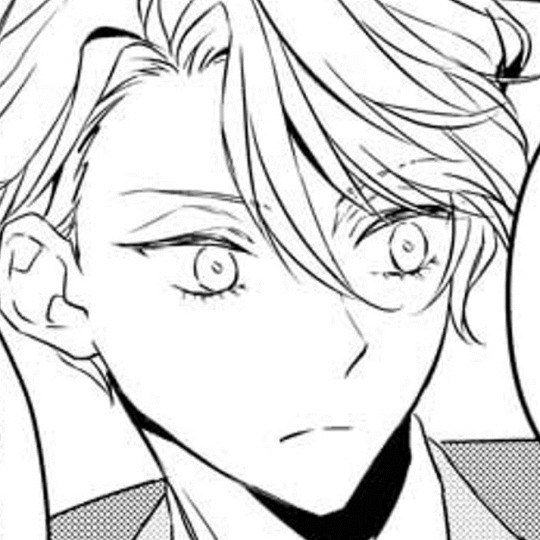

When you get a shot of his just his face, it is legitimately kind of confusing what gender he is supposed to be.
At boarding school, Richard had male classmates fighting over him as trophy—something he didn’t ask for, didn’t want, and something that was blamed on him. After all, he was Different. He was distractingly gorgeous, even to boys, his expressions of affection too strong, too violative of accepted boundaries, and he loved pretty, girly things like jewelry. He was soft and gentle and kind. He didn’t fit the definition they wanted to impose on a young boy growing into a man, and he didn’t fit into womanhood, either. He’s too pretty, too confusing, looks too much like a woman and acts too much unlike a man. Any indication of queerness on the part of these other young upstanding young men was his fault. because society views queerness as contagious (and isn’t it, in a way? Once a person meets a queer person, they’re much more likely to discover the parts of themselves that are queer). He was obviously strange, and obviously feminine, which made him dangerous to The Order of Things.
When he invited some of these friends to visit him over the summer in France while he stayed at a villa with his mother, once they laid eyes on his mother, all thought of Richard disappeared from their heads. Why would they need his male beauty when a female equivalent existed right there? Much more proper. Much more appropriate for them. Much more…what they wanted.
Richard was only a substitute when they needed one. He was the closest thing to a beautiful woman. When an actual woman was there (especially one that could rival his own odd beauty), it turned out they only really liked him for that, and they dropped him. And Richard was so hurt by discovering he was just a replacement and a convenience for straight people that he stopped inviting people to see his mother. He wouldn’t even invite Deborah, his fiancée, a woman, to meet his mother, because…what if? What if he was just a replacement again?
Richard did not bring anyone back home again to meet Catherine until Seigi. This is fascinating, because Seigi did a lot of substitution when they first met. Every time he would think of his intense, queer feelings for Richard, he immediately, before he even realized what was happening, redirected them at a woman. With Tanimoto, or later even just a theoretical woman.
There’s a great manga cap of Seigi telling his college buddies about his gorgeous foreign boss and they all assume he’s talking about a woman. This is what Seigi’s head was doing in the background all throughout the first act of The Case Files of Richard the Jeweler.

This is also what Richard’s friend did to him.
I could write a whole other essay about Seigi and Richard and Catherine and compulsory heterosexuality, and I honestly really want to, but that’s a long derailment and this about is about Richard. And speaking of Richard and Deborah, wow, Richard. Wow. On the surface, that seems so normal. Lonely man finally finds someone who cares about him, he falls in love, and his family ruins it.
Except I’m not sure that’s actually what happened.
Deborah was someone he loved, someone he wanted to build a life with, maybe, but most importantly, she was a friend he thought understood him, one he might be able to keep after everyone he kept losing.
I don’t know if I can’t explain to alloromantic people what reading about Richard choosing a life partner based not on romantic affection but on a desperate desire to be able to keep a friend and not be alone was like for me as an aromantic person. Amatonormativity spends so much time insisting that you get one life partner, they must be a romantic life partner, and all other relationships are expendable in favor of your romantic spouse.
This insistence hurts everyone, but it especially hurts people who never really wanted to or managed to form a romantic bond with other people that was acceptable and valid enough. And it doubly hurts people like Richard, who already has such strong abandonment issues after his friends and parents mostly dropped him and pushed him off on other people.
And damn if it wasn’t one of my first times reading a fictional character struggling with that.
But Deborah was willing to marry him, even without romance. He finally had someone, and he clung to her. The timeline of The Case Files of Richard the Jeweler is frequently messy and often inconsistent, but it is very likely he proposed to her after he realized that marriage to her might not even be possible due to the legal restrictions of The Will (of course, interracial marriages have their own long history with this that I am far from qualified to speak on, so I won’t).
His family, particularly Jeffrey, was supportive despite that…at first. Richard’s uncle was willing to let Richard marry who he wanted (after all, Richard was the spare, wasn’t he? Godfrey had two real sons). Right up until it became obvious after spending years with lawyers that there was simply no reconciling Richard’s love with the family’s needs, and Richard was expected to set aside his desires in order to conform to the family’s expectations and support the family in the ways they demanded it. Deborah was not an Acceptable partner, and society was going to look at the whole family, Richard. Time to bury yourself and do your duty and marry someone you don’t and maybe even can’t love.
The amount of historical pain queer people have, being forced to do this, is immeasurable.
Richard’s love, as queer as it was, was taken from him. Deborah told him she didn’t even know why he thought it would work out in the first place, which is brutally harsh. It became obvious the biological family he had wouldn’t support it, and he simply couldn’t do it anymore. He had spent years trying and failing to win their approval, but they had finally taken too much from him.
He ran to an entirely different country and refused to respond to the legal name on all his legal paperwork. Richard might not be trans, as much as some of his androgyny sometimes speaks to that experience (see again: hatred of growing up with his mother’s face), and the series provides little if any allowance to interpret him that way, but Good Lord, running away from your family to start fresh with a new identity? There’s a reason that around a quarter of homeless youth in the UK are some variety of queer.
Richard was wealthy enough to run off to another country for his mental health crisis, and he picked not only one where his family, his own namesake, had been safe to love freely before, but a country that was, once, a place with much looser laws around homosexuality than the UK that made it a so safe place for queer British colonialists to settle in safety.
Saul and Seigi both question Richard’s motivations for his actions as a con artist (why is he selling valuable stones for cheap to people he likes, and punishing people he doesn’t?). Here is the thing about that: this was not only something that he inherited from his grandmother whose love was also looked down on by society, but it’s something he didn’t respect, something he loathed. His behavior was meant to punish himself.
It’s important that he was using gemstones for this: something he loved, something that wasn’t accepted as something a man should love, but that he found innately beautiful and compelling anyway. He hurt himself with them and punished himself with them because he hadn’t ever been allowed to love those parts of himself. He didn’t see himself as worthy, or see a way to love these things healthily in a way that both he, and they, deserved. Saul told him in Sri Lanka that he could see the love of gemstones light up his eyes, even though Richard was certainly trying to hide it at that point and wasn’t willing to accept that about himself.
Saul also tells Richard at this time that he has no self-awareness, and no introspection. Sound like someone else we know? Sound anything like queer people who don’t know their way or what they want yet? Richard was still spinning wildly out of control back then, and I’ll argue he still hadn’t quite realized anything about his own queerness.
And the thing that healed him, the thing that scarred over these wounds and allowed him to live, was a found family made of people who loved them the way he loved. People who encouraged him to be himself, even as a weird as that person was. Who encouraged, very specifically, a fairly transgressive love of jewelry and beauty and told him not only was it okay that he loved that, but that he could make that love his life.
Monica, Saul’s adopted daughter, was adopted from one of Saul’s own little found family members: one of his very best friends gave Saul custody of her welfare after his death instead of a biological family member. Monica escaped an abusive marriage to come with Saul and find her own healing. Saul’s sister-in-law came to study gemstones and jewelry with him while they were both mourning the loss of Saul’s wife and Maya’s sister. Richard found Saul there, who Seigi even says is much alike Richard in the way they are stubbornly kind, gentle-hearted men. All of them found familial love with each other when romantic love wasn’t working out for any of them, when their biological families couldn’t support them anymore.
Specifically, when Richard’s biological family decided he was too much and too wrong for them, he made his own little patchwork family to replace them. Found Family is one of the queerest tropes there is, because too often queer people are rejected from the homes they are born in and it is their way of making a new place for themselves with new people. Like I said earlier: queer realizations might be just a little contagious. People who defy society’s expectations are a much more likely place to find your own deviancies than society is.
Some four years after living with this little found family made of people who love the same things he does, the same way he does, all in ways that society doesn’t necessarily respect, Richard has the introspection and self-awareness Saul knew he lacked. By the time we meet him in Japan alongside Seigi, it’s pretty obvious he figured out who he is and how he loves, and that this way is very, very queer. And he seems pretty damn okay with it!
It was with these people that Richard found himself and found some kind of inner peace. He healed. And he didn’t necessarily heal the best he could’ve—I’ve more than once referred to this series as akin to watching a poorly-healed fractured leg being rebroken and set with pins so it heals straight and true, and that is as true of Richard as it is of Seigi and any of their customers.
But it was something he needed then to live.
They allowed and encouraged him to love people in ways society didn’t approve of, love things society didn’t approve of, let him be a strange, wild disaster for a few years, and he came out of it finally knowing who and what he was.
132 notes
·
View notes
Text
report this account!!

hii good people, please report the account @dodolipaks !!!!
they reposted my art with the same caption and tags and it seems theyve also done it with another persons art. ive already reported the account and post but i dont appreciate stealing :(
43 notes
·
View notes
Text
i've been rewatching hq season 2 lately and just remembered how much i love the 1st years...the 5 of them are my little scrunklies they're so so cute
also remembered a fic i wrote which features their friendship a lot. it has kanoyachi as the main pairing (tsukkiyama and kagehina as side pairings) so if anyone's interested in seeing my love for yachi and her best friends you can check it out here! it features yachi being roommates with kanoka, becoming manager for their uni volleyball team and falling in love with her and is canon compliant! it's a rarepair but a real labour of love and i'd appreciate more people reading it!
https://archiveofourown.org/works/31431977
#haikyuu!!#yachi hitoka#hinata shouyou#kageyama tobio#kagehina#tsukishima kei#yamaguchi tadashi#tsukkiyama#karasuno first years#amanai kanoka#kanoyachi#anime#ao3#fanfiction#manga
6 notes
·
View notes
Text

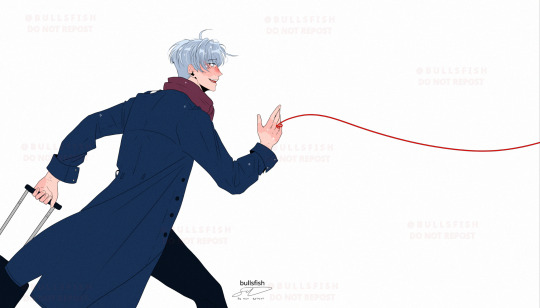


And they were soulmates.
Happy secret santa for @probablytoooldforthis !
4K notes
·
View notes
Text



Saw this tweet and thought it sounded like something that would happen to them
4K notes
·
View notes
Text
since it's canon that wednesday has been down bad for enid since day 1


the texts are from Wednesday: A Novelization of Season One by Tehlor Kay Mejia (official, licensed by netflix)
5K notes
·
View notes
Text
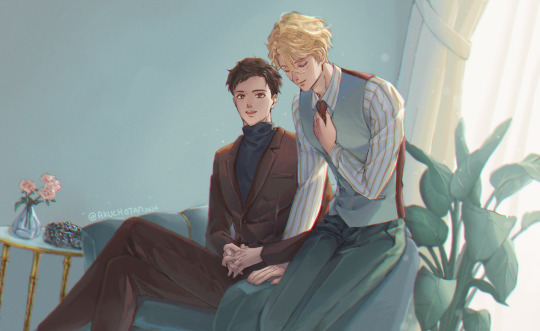


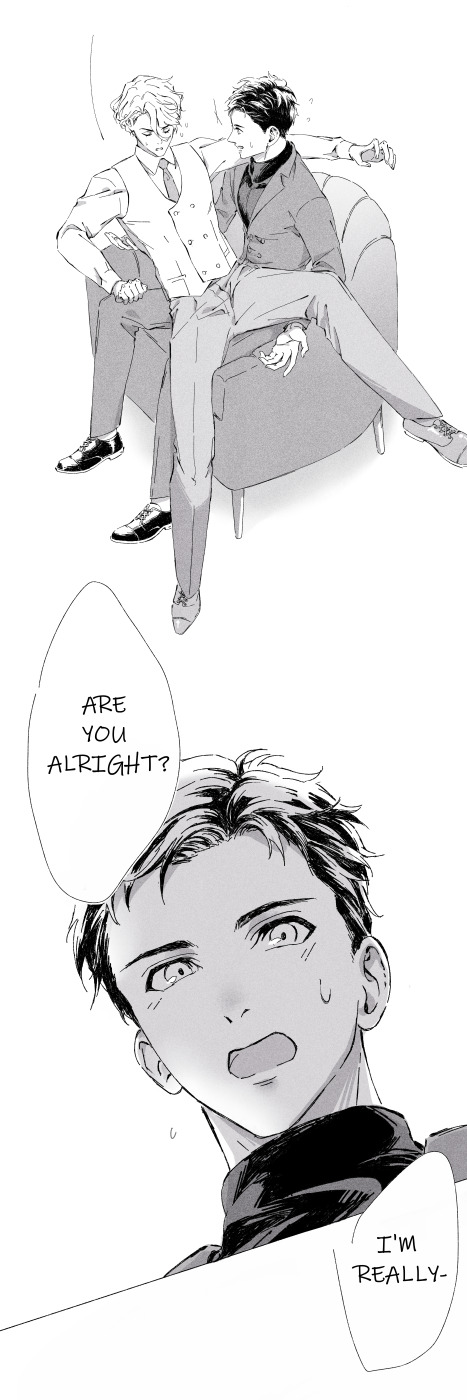

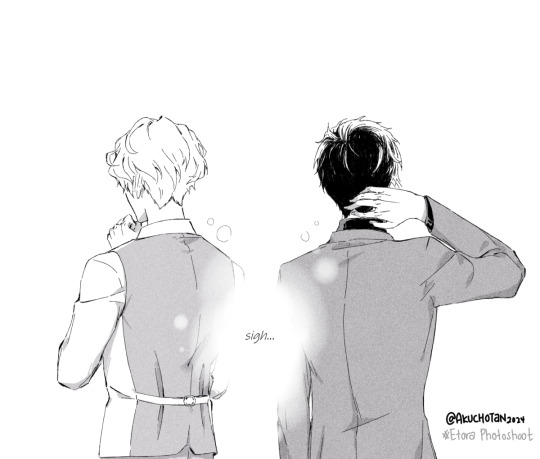
Happy New Year!
this fanart is unrelated to new year though. I missed the right time to post this back in October………….. so…… yep.
91 notes
·
View notes
Text



i failed to shorten it.
#oh my sweet etra#i'm going to cry i love them#SEIGIIIII#god i'll miss them so much they're my favourite guys of all time
89 notes
·
View notes
Text
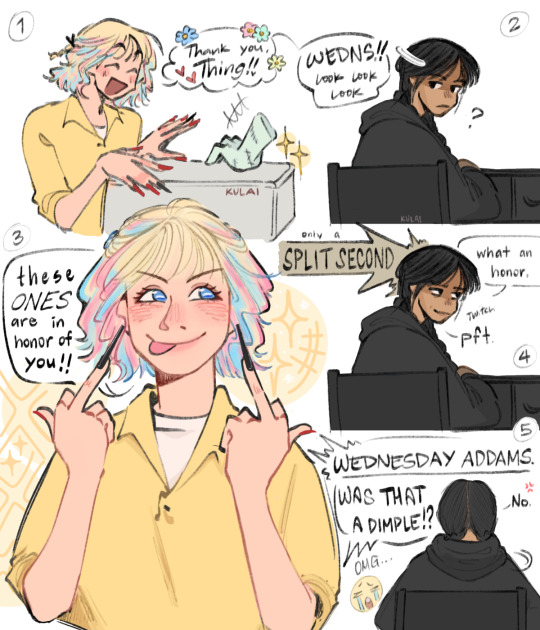
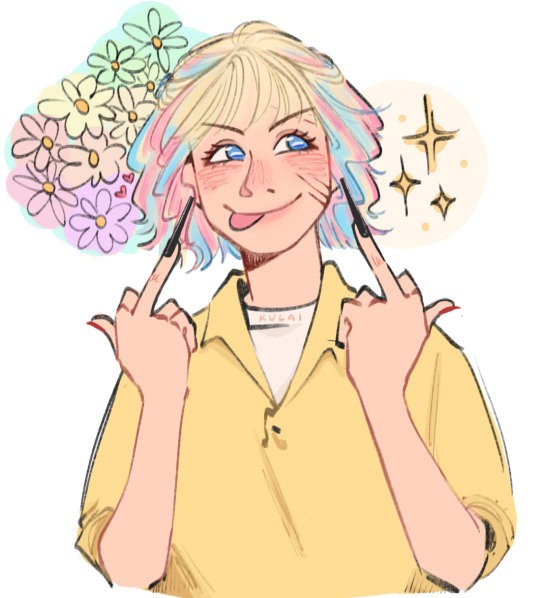
based on the trailer with Enid's new hair and nails for season 2!! :P
3K notes
·
View notes
Text


decided to redraw and improve this silly thing i did two years ago
here's the two compared like damn the colors on the first what was that 😭

5K notes
·
View notes
Text

I love this part in vol. 9 so much because it says so much from Richard's perspective even without his POV.
Imagine being Richard and loving Seigi for years and knowing he loves you the same, but the second he finds out your ex is single again he assumes that you want to remarry her. Because he is an idiot. With the self-awareness of a shoe, he then bursts into tears at the thought of you leaving, and his hysterics are the only thing keeping you together because the alternative is not a single thing has processed in his pinhead.
He has no clue what you just implied, as is standard. Gay chicken continues for 2 more volumes.
40 notes
·
View notes
Text

hi if you read this series im BEGGING and PLEADING you to pls talk to me about them
(jan 2024)
39 notes
·
View notes
